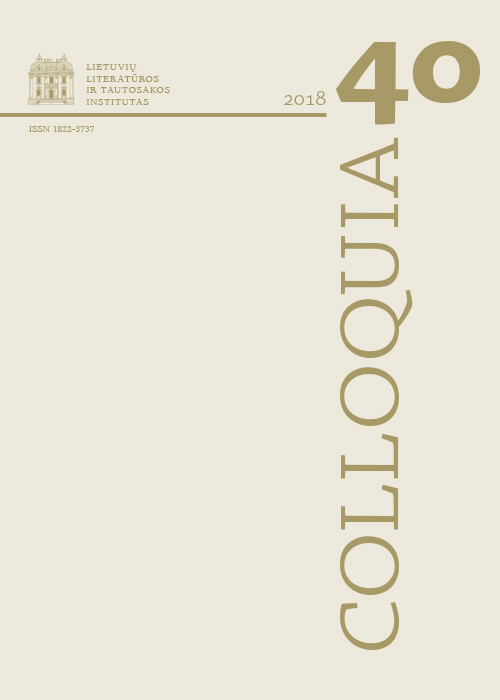The Short Novel The Sound of Organs in a Laundry: One Generation’s Attitudes During the Soviet Period
Abstract
The author of this article calls into question the genre identification of Juozas Aputis’s work Vargonų balsas skalbykloje (The Sound of Organs in a Laundry), which is technically a “short novel,” and analyses the different life paths of the three main characters (a famous organist, a high-ranking official and the latter’s wife) using the productive Soviet Studies concept of “cultural attitude.” Key factors determining attitude are understanding of the situation and the conscious or instinctive choice of career. The publication of the novel in 1989 indicates that, with the collapse of the Soviet regime, Aputis was able to more openly examine questions of collaboration and non-conformism, the significance of individual’s ethical principles which determines diverse relationships to the ideological regime. Equally traumatised by the horrors of the post-war period, the now adult characters represent fundamentally divergent attitudes. At the end of the article the author examines the revisions that Aputis made and considers what determined them when the work was republished in 2010.
Downloads
Most read articles by the same author(s)
- Jūratė Sprindytė, The Intelligentsia in a Political Epoch , Colloquia: Vol. 49 (2022)
- Aistė Kučinskienė, Jūratė Sprindytė, Virginija Cibarauskė, Jūratė Čerškutė, Rima Bertašavičiūtė, Apie doktorantūros studijas, laisvalaikį ir akademines erdves , Colloquia: Vol. 33 (2014)
- Jūratė Sprindytė, The Expression of Meanings, the Meaning of Expression , Colloquia: Vol. 37 (2016)
- Jūratė Sprindytė, Martinkaus estezė, arba kaip susiverpti Ariadnės siūlą , Colloquia: Vol. 33 (2014)
- Jūratė Sprindytė, Gintarė Bernotienė, Foreword , Colloquia: Vol. 40 (2018)
- Jūratė Sprindytė, With no Cracks , Colloquia: Vol. 41 (2018)
- Jūratė Sprindytė, Gintarė Bernotienė, Foreword , Colloquia: Vol. 39 (2017)
- Jūratė Sprindytė, Foreword , Colloquia: Vol. 38 (2017)
- Jūratė Sprindytė, Foreword , Colloquia: Vol. 41 (2018)
- Jūratė Sprindytė, On the Vital Attachment to Literature: An Acceptance Speech of the Vytautas Kubilius Prize , Colloquia: Vol. 54 (2024): Colloquia




